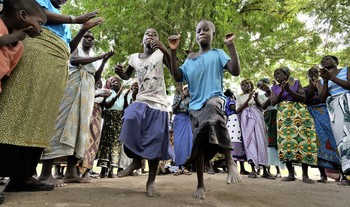Lent, a season for prayer and reflection for Christians around the world has become an opportunity for the churches to respond to climate change, an issue which deeply impacts the communities they serve.
It is therefore significant that a March 31 report from the International Panel on Climate Change (IPCC) comes in the middle of the Lent season. This report brings in focus the impact of climate change, options of adaptation, and assessment of the vulnerability of socio-economic and natural systems and communities.
This report, with its detailed analysis, describes the impact of climate change, warning that the situation will get worst in the 21st century. The poor in countries of the South will suffer more from climate change, while being faced with food insecurity, lack of access to water, displacements and increased conflicts.
The IPCC report is important for the churches, who are witnessing effects of climate change on communities, making climate justice a priority in their pastoral plans.
This priority was reflected in the 10th Assembly of the World Council of Churches (WCC) in South Korea last year, which adopted a Minute on Climate Justice calling “churches and ecumenical organizations to insist that the respective governments look beyond national interests in order to be responsible towards God’s creation and our common future, and urge them to safeguard and promote the basic human rights of those who are threatened by the effects of climate change.”
One initiative from a Christian organization this Lent season is Fast for Life, a call from the Ecumenical Advocacy Alliance, which started on Ash Wednesday. The campaign raises awareness on how much Carbon Dioxide (Co2) emissions are generated from food that is wasted. It is an invitation to “Join the Zero Waste Daily Challenge” establishing “waste-trackers” at home and providing resources for organizing related actions, worships and other events.
The Anglican Communion Environmental Network has proposed a Carbon Fast during the Lent, suggesting concrete actions to ensure climate justice. Rowan Williams, former Archbishop of Canterbury, have also argued recently that Western lifestyles bear responsibility for causing climate change in world’s poorest regions.
In Switzerland church-related development agencies have focused on intergenerational justice for their Lent campaign, stressing the need for effectively addressing climate change for future generations.
Promoting climate justice
The youth department of the Lutheran World Federation (LWF), together with its partners issued a call Fast for the Climate. The call is an invitation to fast on first day of each month. It invokes spiritual expressions and ethical values, urging national governments to be more ambitious in climate change negotiations.
In an April 1 LWF 1 communique, WCC Central Committee member Metropolitan Serafim Kykotis, of the Orthodox Patriarchate of Alexandria and All Africa, reminded that fasting “always has noteworthy intentions: the transformation of ourselves to do good things for the whole creation of God.”
While addressing climate change, the need for transformation in our actions cannot be limited to individuals only. There is also a need for responsible actions and influential agreements by the state institutions.
The Conferences of Parties of the United Nations Framework Convention on Climate Change (UNFCCC) have not yet delivered the multilateral agreement to curb down Co2 emissions and preventing increase of average temperature in the world.
Yet there are steps that can help strengthen the negotiations on climate change. One initiative is the upcoming Climate Summit 2014 in New York, called by the U.N. Secretary General, Ban Ki-moon, in September this year.
Ban Ki-moon has asked heads of the states to “bring to the summit bold pledges”. “Innovate, scale-up, cooperate and deliver concrete action that will close the emissions gap and put us on track for an ambitious legal agreement through the UNFCCC process,” he said.
As part of these efforts, the WCC will organize an interfaith summit on climate change before the Climate Summit to make a call from the faith leaders urging international community to effectively address climate change.
Echoing vulnerable communities’ experiences in different regions, churches and faith communities for decades have appealed for an effective transformation of current development patterns and consumerist lifestyles, which are depleting the planet.
Again, the IPCC’s new report confirms that time is running short; reminding us that visible and effective efforts should be made to strengthen climate resilience in order to reduce the risks of climate change.
Guillermo Kerber is the WCC program executive for Care for Creation and Climate Justice.

